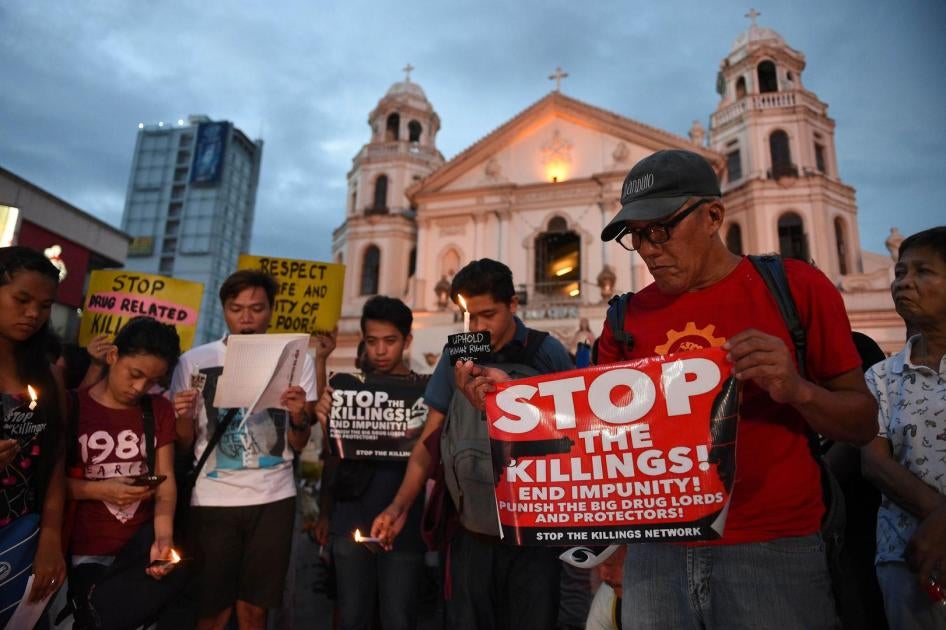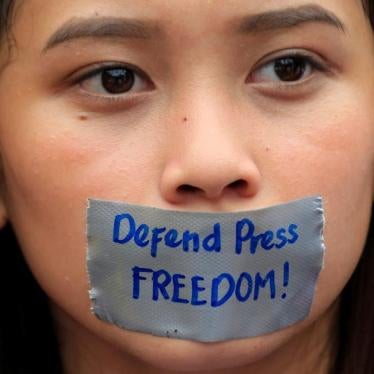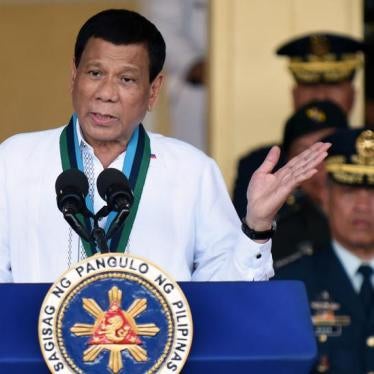(New York) – Philippine President Rodrigo Duterte’s administration heightened its repression in 2018, Human Rights Watch said today in its World Report 2019.
The government’s murderous “war on drugs” expanded to cities outside Manila. Attacks escalated against activists, journalists, and critics of the government. Donor governments should intensify pressure on Duterte to end targeted killings and to drop politically motivated criminal cases.
“President Duterte has used the killing of thousands of largely poor drug suspects as a tool to bolster his popularity,” said Brad Adams, Asia director. “He’s also targeting anyone who might undermine that popularity, from outspoken senators to journalists documenting his abuses.”
In the 674-page World Report 2019, its 29th edition, Human Rights Watch reviewed human rights practices in more than 100 countries. In his introductory essay, Executive Director Kenneth Roth says that the populists spreading hatred and intolerance in many countries are spawning a resistance. New alliances of rights-respecting governments, often prompted and joined by civic groups and the public, are raising the cost of autocratic excess. Their successes illustrate the possibility of defending human rights – indeed, the responsibility to do so – even in darker times.
The extrajudicial killings of drug suspects expanded to urban areas outside the capital in 2018. Nationwide, the Philippine National Police (PNP) said, nearly 5,000 drug suspects were killed between July 2016 and November 2018 during anti-drug operations, although domestic rights groups assert that police and alleged police agents killed thousands more.
The administration stepped up its attacks against “drug war” critics, including activist groups, the Catholic church, opposition politicians, and the media. In December the authorities brought politically motivated charges for tax evasion against the critical news website Rappler and its editor, Maria Ressa.
Duterte targeted the Catholic church, which has criticized the “drug war,” accusing bishops of corruption and labeling most Filipino priests homosexuals. In December, he urged the public to kill “useless bishops” because “all they do is criticize” the government.
The government vilified activist groups, calling them communists, and terrorists. In March, the foreign affairs secretary accused human rights groups of being “unwitting tools” of drug syndicates. In November, gunmen killed a rights lawyer, Benjamin Ramos, in Negros Occidental. Ramos represented the families of victims of a recent massacre of peasants in the province. There were violent attacks against human rights activists, lawyers, journalists, environmentalists, indigenous group members, peasants, and farmers.
Senator Leila de Lima, Duterte’s most prominent critic, has remained in jail since her arrest in February 2017 on trumped-up drug charges. Another senator, Antonio Trillanes IV, was also threatened with arrest in September for criticizing Duterte. In May, acting on a petition by the government, the Supreme Court ousted Chief Justice Maria Lourdes Sereno for her criticism of the “drug war” and other policies of the Duterte administration.
There were two rare triumphs of accountability in the Philippines in 2018. One was the conviction in September of retired Maj. Gen. Jovito Palparan and two others for the 2006 kidnapping and illegal detention of two student activists. In November, three police officers were convicted for the August 2017 “drug war” murder of 17-year-old Kian delos Santos.
“President Duterte has provided no indication of any letup in his murderous drug war,” Adams said. “Foreign donors should support efforts by Philippine institutions, groups and the media who are pressing the government to stop the killings and bring those responsible to justice.”









